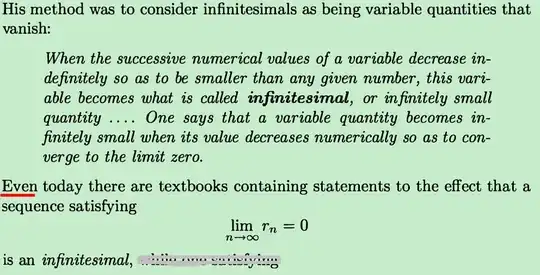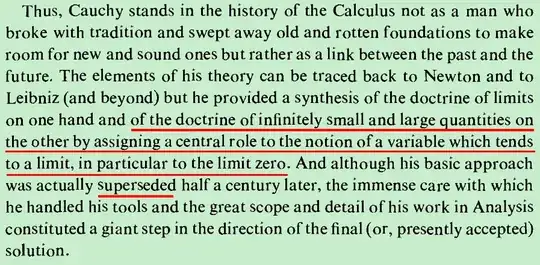You ask "why Cauchy's definition of infinitesimal, along with his 'basic approach' was superseded?"
The answer is that Cantor, Dedekind, Weierstrass and others developed a foundation for analysis to deal with certain difficulties related to Fourier series, uniform continuity, and uniform convergence. This development resulted in a formalisation that was a decisive moment in the history of analysis and was a great accomplishment. This is all well-known and rivers of ink have been spilt on the subject.
Yet the great accomplishment masked a significant failure that is less frequently spoken about. Namely, these 19th century giants failed to formalize an aspect of the procedures of calculus and analysis that was ubiquitous until and including Cauchy, namely the notion of infinitesimal. Instead, they provided infinitesimal-free paraphrases for the traditional definitions. For example, Cauchy's lucid definition of continuity of $y=f(x)$ ("infinitesimal change in $x$ always leads to infinitesimal change in $y$") got replaced by the familiar jargon ("for every epsilon there exists a delta such that, if $|x-c|$ is less then delta, then $|f(x)-f(c)|$, etc.").
Not only did they fail to formalize it but, unable to do so, some of them became convinced that there was something wrong with the notion of infinitesimal itself, and from this jumped to the conclusion that infinitesimals must be inconsistent or self-contradictory. Cantor went as far as publishing an article claiming to "prove" that infinitesimals were inconsistent. In correspondence Cantor referred to infinitesimals as "paper numbers", "cholera bacillus of mathematics", and even "abomination"; the details can be found in
Dauben, Joseph Warren. Georg Cantor. His mathematics and philosophy of the infinite. Princeton University Press, Princeton, NJ, 1990
and
Ehrlich, Philip. The rise of non-Archimedean mathematics and the roots of a misconception. I. The emergence of non-Archimedean systems of magnitudes.
Arch. Hist. Exact Sci. 60 (2006), no. 1, 1–121.
A solid set-theoretic formalisation for infinitesimals did not emerge until around 1960 and by then Weierstrassian paraphrases were solidly in place, making it difficult to overcome institutional inertia.
Cauchy's idea of representing an infinitesimal by a sequence tending to zero is basically valid, but needs some polishing. Cauchy's infinitesimal specifically is dealt with in a number of articles that you can find here.
 Why says 'Even'?
Why says 'Even'? why Cauchy's definition of infinitesimal, along with his 'basic approach' was superseded?
why Cauchy's definition of infinitesimal, along with his 'basic approach' was superseded?